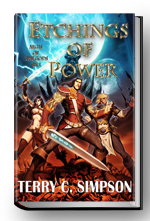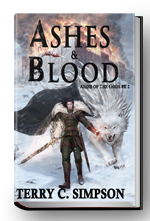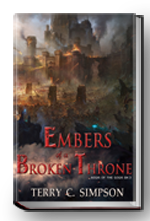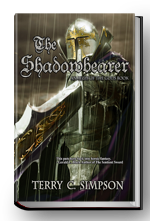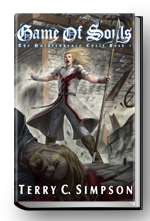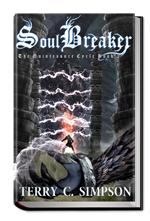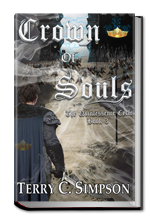Table of Contents
Men are Monsters
Years Later
Peoples’ souls were being torn out in the plaza below Keedar Giorin. Not literally, but if removing a person’s essence were possible, the results might resemble what he witnessed. Cries and wails echoed up to his position on the rooftop as a mother lost a child. That child would soon forget her face. Keedar could picture the mother’s expression: eyes vacant as if she died that instant, as if her soul had been removed. She fell to the ground sobbing.
Other folk awaited their turn on the mostly broken cobblestones near the woman. For many, when the soldiers took their children, their expressions would match hers. Desperation clung to them like a dark cloak. They pleaded, tears streaming down their cheeks, unheard prayers slipping from their lips.
A scant few were hopeful. Hopeful their child wouldn’t be chosen. Or that their child would be.
A gloved fist clenched, Keedar closed his eyes and sucked in a long, slow breath, of the Smear’s foul air. The image of that mother and the others like her would be imprinted in his mind for some time. It would bring nightmares to join those he already suffered. Nightmares of his father dead on the ground, golden scales appearing on his skin as Keedar stood over him with silver scales sprouting from his arm and face. No, that would never happen. It was only a dream. When he gazed down on the square once more, he was calmer, but not by much.
In respect to people like this mother, he wore his worst rags. The clothing smelled of the folk who once owned them, mingled with his mustiness and sweat. A patchwork quilt of memories. A recollection of those souls lost since the day his mother gave her life so he wouldn’t share their fate. Ever since he could sneak out onto Kasandar’s streets on his own, he’d gathered the cast off clothing, the discarded pain, mementos too agonizing for parents to keep.
Under a midday sun whose warmth didn’t seem to grace them, people huddled in a mass below him and farther up the lane, many in garb similar to his own, awaiting their turn with an examiner. For today was the Day of Accolades. The Smear’s residents presented the king his due. Glorious King Jemare who made certain the Kasinian Empire thrived. And with it, so did its people.
Except those in the Smear.
The thought of the king, of the folk in the Smear suffering, made Keedar grind his jaw. People might laud the king for the advances in society, for the thriving lives of the middle and upper class, but this … this in square, the Smear itself, was the true canvas on which King Jemare and the monarchs before him should be judged. Their work was drawn in blood and misery.
These people gave of themselves but received little in return. Once, every two years, by order of a royal decree several hundred years old, they surrendered more. If one were to be so bold as to ask the nobility, they would reply that the gift the Smear’s residents got for their sacrifice was one of life, as meager as it was.
This was a tribute of souls, of babes, of those too young to protest, to offer resistance, to understand their plight. In the citadel of Kasandar, ancient custom was like the rising and setting of the sun: inevitable, a routine on which the city thrived much like the rest of the Empire.
Keedar dreamed of the day things would be different. If his people were truly descendants of the fabled Dracodar with silver or golden scales, power to have once ruled the known world, when would they stand up for themselves? When would this oppression end? He’d heard nobles tell stories as if the Dracodar were monsters that came in the night to enslave, murder, eat the dead, and steal children. The only people he had ever witnessed do anything of the sort were the nobility themselves.
Once, long before he understood, Keedar wondered why the Smear’s residents contributed to the Day of Accolades. The answer lay in the leather-armored men and women who stood guard over the proceedings: the King’s Blades. Another squad of them marched toward the square, the cadence of their booted footsteps so synchronous it was akin to listening to a drumbeat. People on the street, regardless of their heritage or their position in society, made way for the Blades. In turn, these warriors accepted it as their due.
For those children chosen, this was their fate. To serve in Kasinia’s armies, to become among the elite, to have songs sang of them should they fall as heroes, a chance for a better life. Which mother or father wouldn’t want such a thing if they’d lived—no—if they’d survived and suffered within the Smear’s shadowy, rodent and garbage infested streets?
My mother for one.
Despite her decision and his father stating the Blades were a travesty, Keedar often thought of what it would have been like to become one. To serve. To die with honor. To live never having to scrounge, not needing to despair over the next meal, or sell one’s body, or sit on some corner begging for alms, or fear a knife in the dark. Such a chance was lost to him, as fleeting as the wind that blew the wisps of his sandy hair across his face. If an examiner discovered him now, Keedar was as good as dead or worse. So, from his vantage on the rooftop, he continued to watch, agonizing over the help he wished he could offer those who wanted to raise their own children, who cherished the idea of freedom.
Keedar harbored no misconception of his ability to relieve their torment. Although he was the son of a gifted father and mother, it was more a curse than anything else. He was small for his seventeen years, blade-slim, not unlike many of his peers in the Smear. A more pious young man might pray to the Gods for his people’s deliverance but not Keedar. The Gods were as likely to help as he was to call on the clouds overhead to break and cause rain to fall. May the hells take the Gods. He didn’t cringe in the slightest at having cursed the deities for their worshippers, the wisemen, did the brunt of the work below.
Dressed in red and blue robes, the wisemen shuffled among the folk, peering at the babies lying on blankets before each parent, and writing their findings in a small book. The insignia on their robes—a ten-pointed star inside a circle with another circle at its center—represented that which Keedar despised and loved. It was the ancient sign of the ten Gods, the pantheon of the Dominion, but it also stood for the skill that kept him alive. How ironic.
Once the wisemen completed their inspection of a row, they passed the notes they made to a crier. This little man, all sinew and bones, announced the names, his voice carrying above the wails. Guards stepped forward to take the children listed.
More than one parent collapsed. Some clutched at the soldiers cloaks, grabbed their booted feet, begged for them not to take their child. A spear butt knocked them off. Others clasped their hands in prayer but made sure not to appear too exultant over their children being spared. Not surprisingly, a few who had been refused, yelled for a guard, offering up their babies.
Keedar despised those latter folk the most. Yet he didn’t hate them.
“Why, Father? Why do they do this,” Keedar said in response to the near-silent footsteps that crept up behind him.
Delisar grunted at having been sensed. “Because men are monsters. Power is the whip that drives them. For a taste, they will sink to new lows.”
“Why do we stand by and do nothing?”
“It is the way things have to be … for now.”
“You’ve said the same every year since I was seven,” Keedar snapped. “A promise of changes to come, and yet the Consortium sits idly by and does nothing to free the people who protect them. What’s the point of the guilds if they do little to make life easier?” Keedar could not help the way he felt, the doubts he harbored, even if he wanted. The guilds profited too much from the Smear. Could he blame them? He asked himself that question regularly. Not once did he say yes. After all, the Smear’s people made up the guilds. Membership was a way out for many.
“I’ll say again … patience.” Father became silent for a moment, his gaze solemn. “None of us should ever end up in a box,” he muttered under his breath.
Keedar opened his mouth to speak, but Father’s upheld hand cut him off. Delisar’s amber eyes became golden rocks, his hairless jaw hardened. In that moment, he changed into the mix of unyielding parent and hard-hearted leader of the Shipmen guild.
“What would you have us do? Attack them?” Father pointed to the Blades. Whether they held spear or sword or stood bare-fisted, they were no less dangerous. “Does your memory of the Night of Blades fail you?” Father’s voice rose a little, heated, “Yes, you were three, but I hear you at night, whimpering, crying out for your Mother. Until we can stand against them and win, we must move carefully, in secret, plotting each step as if it were our last, because it just might be. The king must get his due even if he does not get what he desires.” One arm quivering at his side, Father’s fist opened and closed, opened and closed. Delisar inhaled long and slow. “Patience,” he said softly, “the time will come.”
Father’s mention of Mother brought memories swarming into Keedar’s head. Heat, flames, scales, his mother’s voice as she cackled, the smell of blood.
A man’s yell snapped Keedar’s attention to the plaza. The entire square grew silent except for the brief howl of a swirling wind.
Rags whipped by the gale, the man held a knife in one hand raised above his head in the act of stabbing. The wiseman who he attacked looked on with as much concern as a stone. The man continued to scream, arm straining down, but not inching any closer.
A Blade stepped in front of the wiseman, one gaunleted hand extended, fingers spread wide. A moment later, the attacker’s arm hurtled down, came within half a foot of striking the soldier, and then rebounded. The knife shattered.
Keedar didn’t need to hear the snap to know the man’s arm broke. The awkward angle at which it hung, the bones jutting out from the tangled red mass of his elbow, told its own story. The attacker crumpled to the ground.
The Blade bent on one knee over the whimpering form. Slowly, he raised his hand above his head. A glow spread around his fist.
Keedar looked away, but he could not plug his ears to the sickening crunch.
"Patience,” Father repeated. “Remember all you see, store it. Our time will come.”





